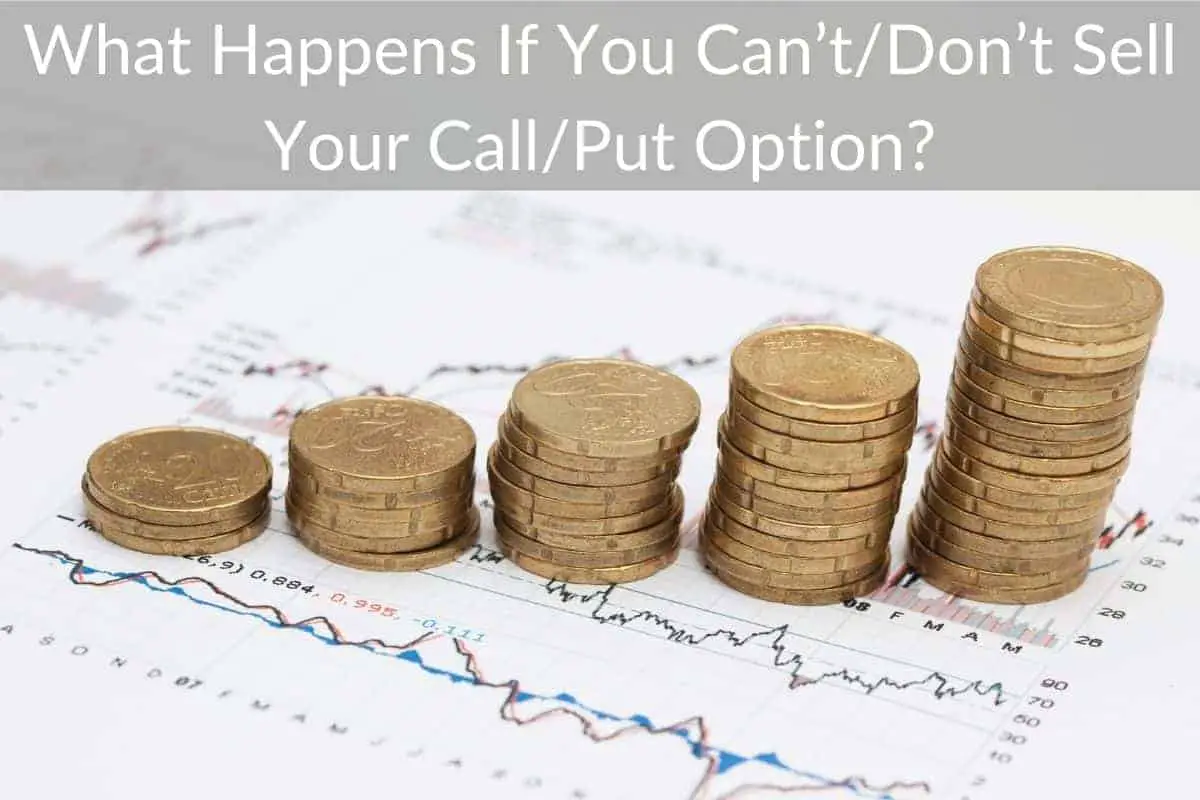Table of Contents
*This post may contain affiliate links. As an Amazon Associate we earn from qualifying purchases.
Selling call options gives you the obligation to sell a stock if it rises to a certain strike price, while selling put options gives you the obligation to buy a stock if it falls to the strike price.
However, buying call or put options gives you the opportunity but not the requirement to buy or sell a stock at the strike price.
But what happens if you can’t or don’t sell the options before they expire?
If you can’t/don’t sell a call/put option, the option will expire worthless if it’s yet to reach the strike price. If the strike price is reached before expiry, most brokers will automatically exercise the option or sell it at market value depending on if you have the money in your account to exercise it.
Not all brokers will automatically sell or exercise options in the expiration date so be sure and check with your broker to see exactly what will happen if you forget or can’t exercise or sell your option that is in the money.
In the rest of this article I will look at what typically happens when you don’t sell options in a typical brokerage account.
What You’re Required To Do When Holding Call or Put Options
Holding a call or put option means you have the right to sell or buy the underlying stock at the designated strike price on or before the expiration date. However, your option is capped by the expiry date.
You have to sell the call or put on or before this date or exercise the option to realize your profit on the option.
If the stock doesn’t reach your designated strike price before the expiration date, the options will expire worthless. You don’t have to do anything if your call or puts are above or below the strike price.
Two possible things can happen if the strike price on your call or put option is reached and you don’t sell. In a put option, the broker will likely sell the option automatically (assuming you don’t have the stock in your account to sell at the strike price).
Since most ours are bought to see an increase in the value as a stock price decreases and not to actually sell the shares it will often be sold at the market price.
On the other hand, a call option that is in the money might be exercised (buying the shares of stock) if you have the money in your account. If you do not most brokerages will sell the in the money call at market price a certain amount of time before the market closes.
Again, many brokers will automatically sell the call option in this situation—even if you don’t want to sell to ensure that you don’t let the in the money call expire worthless.
If a call or put option is out of the money (below the strike for a call or above the strike for a put) you don’t have to do anything. The option will expire worthless at the end of the trading day and it will simply disappear from your account.
How To Avoid Losing Money on Options Expiry
If you don’t or can’t sell your call or put options before expiry, there is a chance that they won’t get sold or exercised (again depending on how your broker handles it).
So there are a few things that you should do to make sure that you don’t lose the profits that you have on an optionZ
Sell The Position Before Expiry
As options get closer to expiry, they lose their value faster. If you’re in the profit, your returns might start to dwindle as the expiry date draws closer. Similarly, holding your losing position until expiry will only worsen the losses.
Closing out your positions when you don’t want to exercise the call or put is a good way to protect your capital. Take your profits or loss before the options expire.
Pay Attention to the Expiry Date of European-Style Options
American options expire on the third Friday of the month, while European-style options expire on the third Thursday of any month. It’s easy to mix things up, especially in the early days of your trading career.
If your options trading approach requires you to close out the European-style position before the expiration day and you don’t remember the time difference, your options can expire before you even realize the situation. In this scenario, you may be left with substantial profits that disappeared.
When European-style options expire on Thursday, you won’t know if they expired in or out of the money until the settlement price is computed. The tabulation occurs late Friday morning or afternoon. To avoid losing money in this situation, it’s best to close out European-style options before expiry.
You can create alerts or reminders to ensure you have the expiry date in mind.
When Should You Allow Options To Expire?
If you have call or put options you might be wondering when it is best to just let them expire. Is there ever a time that you should?
You can allow the call or put options that you purchased to expire when they are out of the money. Out of the money options will be worthless so simply letting them expire won’t hurt anything.
If you sold a call or put and it is far out of the money you could also just let it expire. However, if it is close to the money and you are worried about it possibly going over (or under) the strike price then it’s a good idea to buy back the option.
You could try to let it expire and hope not to get your stock called away (if you sold a call) or not have the stock put to you (if you sold a put) but often if it’s close to the strike it’s better to just buy the call or put back.
Final Thoughts
Many brokers will automatically exercise or sell in-the-money call/put options when you don’t/can’t sell. If the options are out of the money, they’ll expire worthless if you don’t sell, leading to a loss of any premiums or fees.
If you’d like better control over what happens with your options on expiry, it’s important to take the required action or exit your position before that date.

